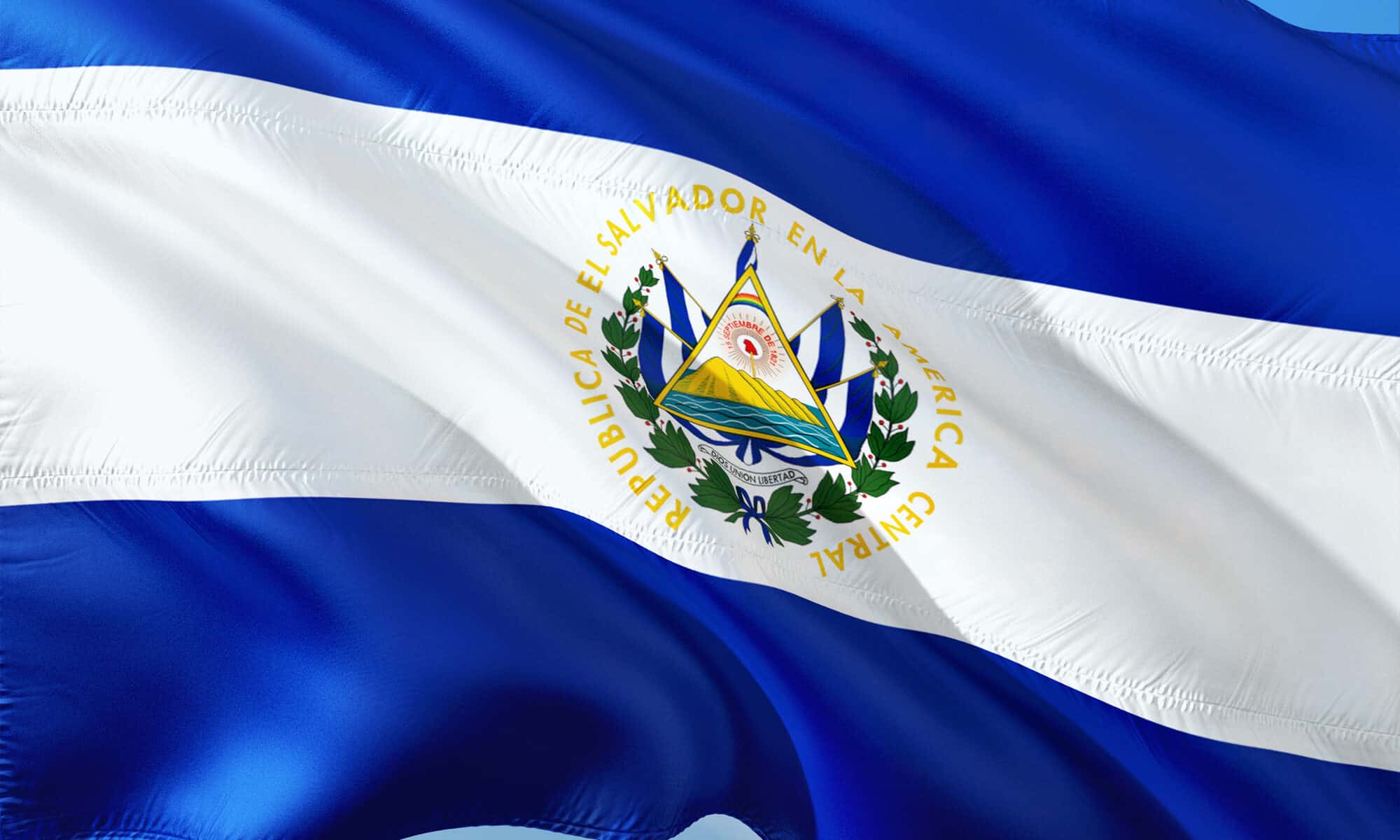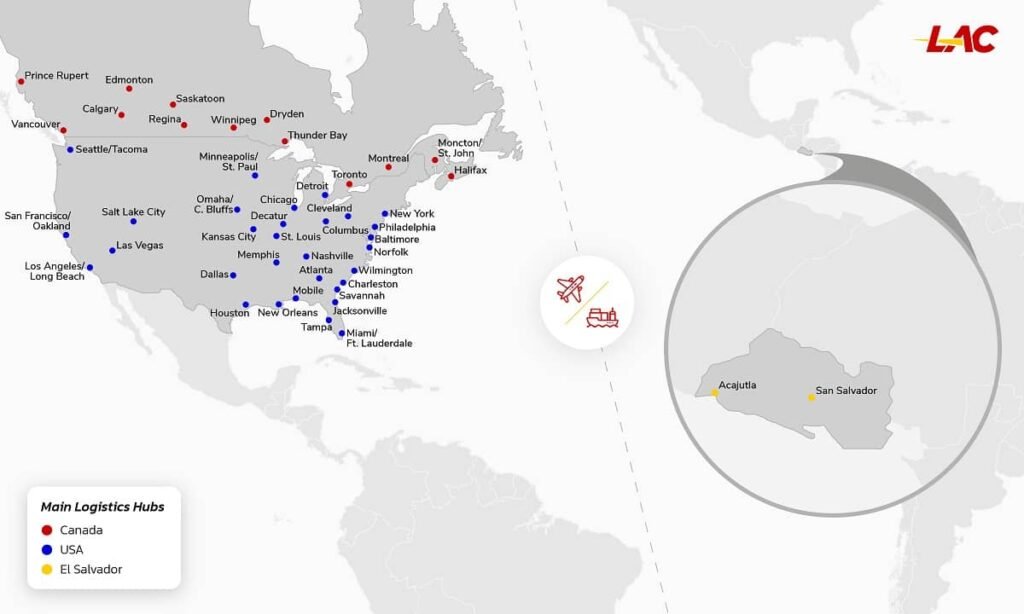
Exporting goods to El Salvador, whether it is for the first time, or on a regular basis, can be a challenging experience. There are many elements to consider when shipping to a country such as El Salvador.
If you are in Canada or the US and not entirely familiar with the Latin American market, you should consider a cargo shipping company that knows the business culture, the language, the customs regulations and has a proven track record of success when it comes to freight shipping to El Salvador.
For over 25 years, LAC has supported North American businesses with expert freight forwarding solutions to El Salvador. Our experience and strong carrier network allow us to offer a full range of reliable, cost-effective shipping services.
With LAC, your cargo reaches Colombia safely, on time, and with complete peace of mind.
Regulations, communication methods, and business etiquette in El Salvador differ significantly from those in the US or Canada.
Salvadorans, known for their warmth and friendliness, attach great importance to developing personal relationships in contrast to the more formal approach common in the US or Canada. Building informal business relationships, or ‘friendships’, is key, as they prefer to do business with familiar faces. Furthermore, their loyalty may be tied more to personal connections than to the company itself. Leveraging third-party introductions is also vital for business success in El Salvador. Having a respected individual vouch for you and your company can significantly boost your credibility.
Salvadorans are known for their flexibility and spontaneity, exhibiting a more relaxed approach to time management than Americans and Europeans. Though punctuality remains crucial for business appointments.
Language can also be a consideration. While many business executives are fluent in English, a good knowledge of Spanish is highly valued in building relationships.

El Salvador, a fully dollarized economy, offers a unique and dynamic backdrop for companies seeking international expansion.
Historically tied to agriculture, the country’s recent market expansion has focused on manufacturing, particularly in sectors like textiles, clothing, and processed foods, often through local assembly plants known as maquiladoras.
The import market has experienced steady growth in recent years, with further increases anticipated. The USA is El Salvador’s largest trading partner, and its dollarized economy eliminates foreign exchange risk and streamlines transaction and financial costs. The new Central American Customs Union with Honduras and Guatemala, along with the Central America – Dominican Republic Free Trade Agreement (CAFTA-DR), present attractive opportunities for exporters, eliminating duties on U.S. consumer and industrial goods. Additionally, there is strong potential for establishing local assembly plants across various industries.
The demand for shipping to and from El Salvador has grown significantly in recent years. Partnering with LAC strengthens your company’s cargo shipping capabilities to this market. Our seasoned professionals possess in-depth knowledge of El Salvador’s market requirements, ensuring smooth and timely import processes. We equip you with the tools and expertise needed to successfully navigate the Salvadoran market.
Our team of logistics experts is ready to optimize your supply chain and deliver seamless shipping solutions.

Navigating the complexities of international trade requires a logistics partner who understands the unique challenges of each market. Every country presents a unique set of laws, guidelines, customs regulations, documentation requirements, restricted goods lists, communication norms, and cultural nuances. To successfully enter the Salvadoran market, you need a logistics partner who understands Salvadoran culture, the business landscape, and the local language.
Our team of experts offers superior freight forwarding services and competitive rates for your cargo shipping to El Salvador. Our combined experience, extensive knowledge, logistics skills, and local connections will ensure a smooth start and guarantee that your goods are transported quickly, safely, and worry-free.
We prioritize your company’s success. If you’re aiming for a successful venture in El Salvador, Latin American Cargo is your ideal freight forwarding partner.
To ship goods internationally to El Salvador, follow these essential steps:
Proper document preparation and working with experienced freight forwarders is advised to ensure smooth customs clearance.
For efficient shipping, consult current Salvadoran regulations and consider professional customs brokerage support, as these requirements are subject to updates and government decrees.

| Port Name | Location | Key Functions & Features | Códigos UNLOCODE |
| Acajutla | Sonsonate, western coast | Main commercial and container port; handles bulk cargo (coffee, sugar, oil, fertilizers), seafood, and has El Salvador’s largest oil refinery. Modern equipment, three terminals, government-operated (CEPA). | SVAQJ |
| La Unión | La Unión, eastern coast | Newest and largest deepwater port; designed for Post-Panamax ships (up to 6,500 TEUs), container and bulk cargo, with space for expansion. Focused on modern logistics, regional hub potential. | SVLUN |
| Airport Name | Location | Key Functions & Features | Códigos IATA |
| El Salvador International Airport (San Óscar Arnulfo Romero y Galdámez,) | Near San Luis Talpa, 50 km from San Salvador | Main international airport; major cargo terminal handles tens of thousands of tons annually (electronics, perishables, flowers, textiles). Ongoing expansion with new cargo and passenger facilities. | SAL |
| Ilopango International Airport | San Salvador | Secondary hub for general, charter, and emergency cargo flights. Suited for smaller cargo aircraft, military, and civil aviation, with basic cargo terminal facilities. | ILS |
| Pacific International Airport (under construction) | La Unión, southeast | New airport project designed to be a major cargo and passenger hub for Central America; features a large cargo terminal, state-of-the-art logistics center, and is expected to serve freight and perishable goods. Planned phases will eventually make it one of the most advanced cargo and passenger airports in the region by 2027. |

Ship containers or any type of goods to El Salvador with our ocean and air freight forwarding services. Our skills and knowledge make us your most reliable partner when shipping freight to El Salvador from anywhere in the world: the US, Canada, Europe, and more.
Learn from the experiences of those who matter most: our customers